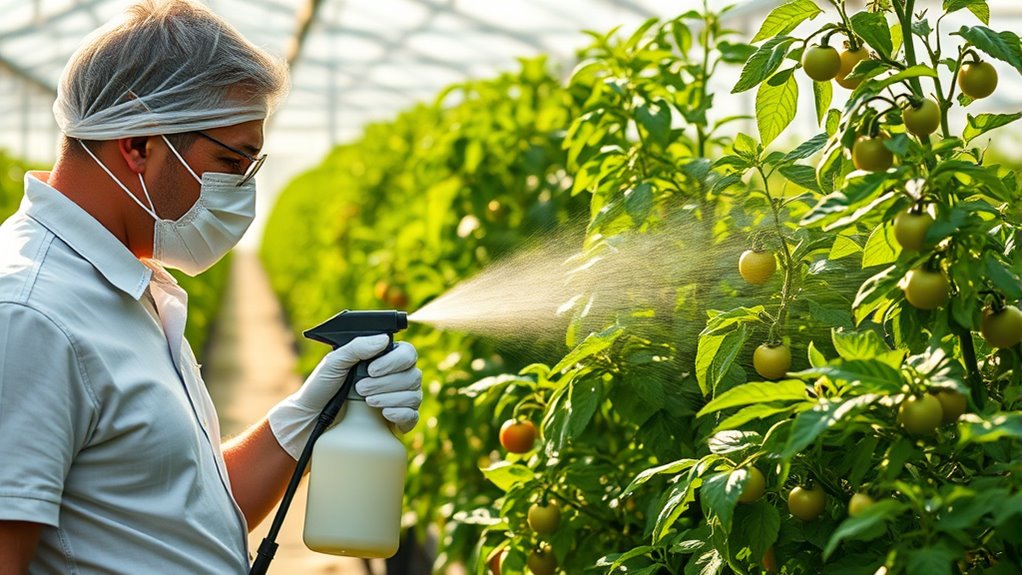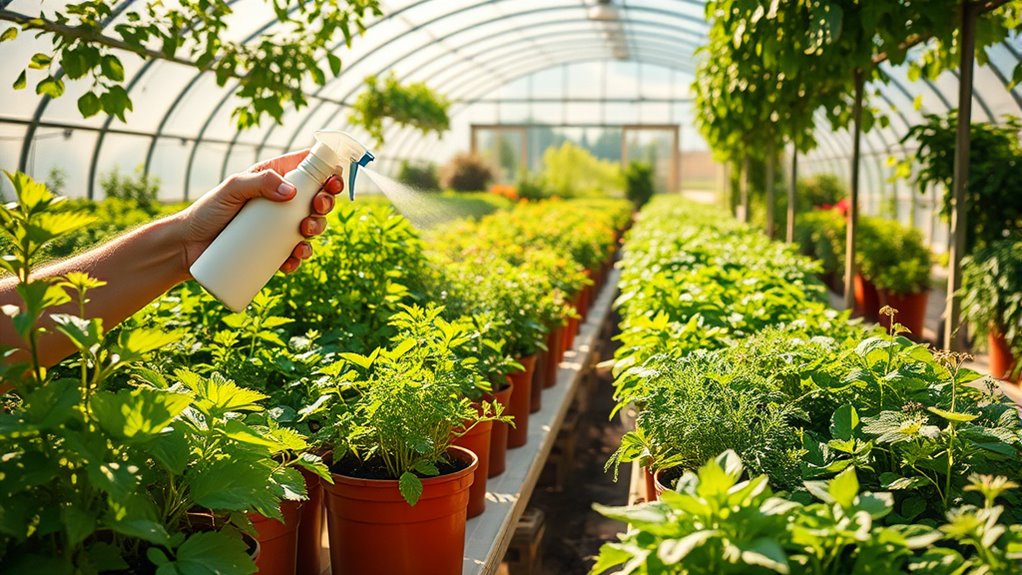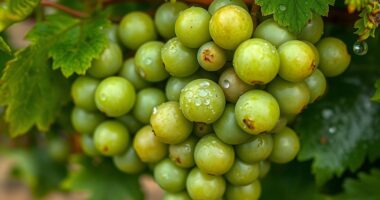Using organic pesticides in your greenhouse provides a safe, eco-friendly way to protect your crops while supporting environmental health. They reduce chemical runoff, protect beneficial insects, and break down quickly after use, minimizing soil and water contamination. These solutions are safer for workers and the ecosystem, integrating smoothly with pest management strategies. If you want to learn how to implement organic pesticides effectively, there’s much more to explore for a sustainable approach.
Key Takeaways
- Organic pesticides are eco-friendly, reducing chemical runoff and protecting biodiversity in greenhouse environments.
- They target pests selectively, safeguarding beneficial insects like pollinators and natural predators.
- Formulated from natural sources, they are biodegradable and safer for workers, plants, and surrounding ecosystems.
- Compatible with integrated pest management strategies, enhancing overall pest control effectiveness sustainably.
- Using organic pesticides improves crop quality, minimizes chemical residues, and supports long-term soil and ecosystem health.

Organic pesticides are gaining popularity in greenhouse cultivation because they offer an eco-friendly alternative to synthetic chemicals. When you choose organic options, you’re embracing natural pest control methods that are safer for your plants, your workers, and the environment. Unlike traditional pesticides, organic solutions rely on naturally derived ingredients, making them a sustainable choice that aligns with environmentally conscious practices. By opting for these products, you reduce the risk of chemical runoff and long-term soil contamination, which benefits the ecosystem surrounding your greenhouse. This shift not only helps protect local wildlife but also guarantees that your crops remain free from harmful residues, which is vital for maintaining high-quality produce.
Using organic pesticides in your greenhouse can markedly enhance the environmental benefits of your cultivation practices. These products are designed to target pests without disrupting beneficial insects like pollinators and predatory insects that naturally control pest populations. When you implement natural pest control techniques, you create a balanced ecosystem where pests are kept in check without the need for harsh chemicals. This approach minimizes contamination of water sources and reduces the risk of pesticide resistance developing among pests. As a result, your greenhouse becomes a more sustainable operation, contributing positively to ecological health and biodiversity.
Organic pesticides support ecological health by targeting pests while preserving beneficial insects and reducing water and soil contamination.
Organic pesticides are also easier to apply safely, giving you peace of mind during application. You don’t have to worry about exposing yourself, your workers, or your plants to harmful chemical residues. Many organic solutions are formulated to be biodegradable, breaking down quickly after application so they don’t linger in the environment. This means you can maintain a healthier workspace and reduce the potential for chemical buildup that can harm soil health over time. Plus, since these products often come from natural sources like plant extracts, minerals, or beneficial microbes, they tend to be less toxic overall, creating a safer environment for everyone involved.
In addition to their health and environmental advantages, organic pesticides often come with the benefit of compatibility with integrated pest management (IPM) strategies. They can be combined with biological control methods, such as releasing predatory insects or employing crop rotation, to create a thorough, sustainable pest control plan. This synergy enhances the effectiveness of your pest management while maintaining ecological integrity. By choosing organic pesticides, you’re not just fighting pests—you’re fostering a healthier, more resilient greenhouse ecosystem that benefits your crops, your workers, and the planet as a whole. Energy efficiency ratings are also a key factor to consider when selecting pest control solutions, ensuring that your practices remain sustainable and cost-effective.
Frequently Asked Questions
Are Organic Pesticides Effective Against All Greenhouse Pests?
You wonder if organic pesticides work on all greenhouse pests. While organic efficacy can be high, pest resistance can develop over time, reducing their effectiveness. Some pests may resist certain organic options, so it’s essential to rotate treatments and combine methods. Organic pesticides are generally effective, but their success depends on pest type, application timing, and resistance management strategies you implement. Always stay vigilant for signs of pest resistance to maintain control.
How Often Should Organic Pesticides Be Applied in a Greenhouse?
You should apply organic pesticides based on your pest management schedule and the severity of the infestation. Typically, application frequency depends on pest activity, often every 7 to 14 days. Monitor your greenhouse closely, and reapply when you notice pest resurgence. Consistent application helps maintain control without overusing pesticides, ensuring a safe environment for your plants and maintaining effective pest management. Adjust the schedule as needed for ideal results.
Can Organic Pesticides Harm Beneficial Insects in Greenhouses?
You might think that organic pesticides are a surefire way to avoid harming beneficial insects, but it’s not always the case. While organic options tend to be more pesticide selective, they can still impact beneficial insect populations if not used carefully. To keep both pests and helpful insects happy, always apply organic pesticides precisely and at the right times, so you’re not throwing the baby out with the bathwater.
Are Organic Pesticides Safe for Children and Pets?
You’re wondering if organic pesticides are safe for children and pets. Generally, they pose fewer risks than synthetic chemicals, but some still require caution. For children safety and pet protection, always follow label instructions carefully, apply when kids and pets are away, and store products securely. Organic pesticides typically break down quickly, reducing harm, but it’s best to use them responsibly to guarantee a safe environment for everyone.
What Are the Best Practices for Storing Organic Pesticides Safely?
Ever wondered how to keep organic pesticides safe? You should always follow proper storage guidelines, ensuring they’re in a cool, dry place away from children and pets. Do you check container labeling for specific instructions? Properly sealed containers prevent leaks or spills, and clearly labeled containers help you identify contents quickly. By adhering to these safety measures, you minimize risks and maintain a safe environment for everyone around your greenhouse.
Conclusion
By choosing organic pesticides, you nurture your greenhouse like a delicate garden of life, ensuring healthy plants and a safe environment. These natural solutions act as gentle guardians, protecting your crops without the harshness of chemicals. Embrace organic options, and you’ll cultivate a thriving, resilient sanctuary that benefits both your plants and the planet. Think of it as planting seeds of sustainability today for a greener, healthier tomorrow.









